Story by Scottie Vickery
Submitted photos
Thanks to an ever-growing assortment of goats, pigs, chickens and horses, there’s always a lot going on at Caren and Danny Davidson’s Springville farm. These days, however, the place is really hopping.
That’s because the newest addition to the family, a red kangaroo named ROOdy, has stolen the hearts of all who have met him. “He makes people happy,” Caren said. “He’s got a great temperament.” Couple that with the fact that ROOdy loves to cuddle, still enjoys a good bottle and rocks the diapers he wears around the house, and there’s no doubt about it. ROOdy is definitely a cutie.
So why did the Davidsons, who host farm day experiences and goat yoga classes at CareDan Farm, decide to jump in with both feet and get a kangaroo? The credit – or blame, depending on when you ask – is all Danny’s. “He’s always trying to come up with something different,” Caren said.
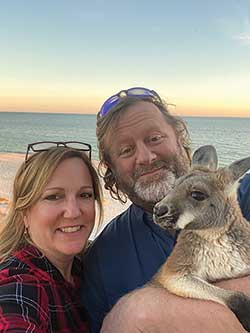
ROOdy, who has grown by leaps and bounds in the six months he’s lived with the Davidsons, was a surprise Christmas present to Caren from Danny. A mere 11 pounds when the 7-month-old arrived at the farm, ROOdy tops the scales at about 25 pounds now. He won’t be fully grown until he’s 2 years old, though, and by then the Davidsons expect he’ll weigh about 200 pounds and stand about 4 feet tall.
“Red kangaroos are the largest kind of kangaroos – and of course, we needed the largest kangaroo,” Caren said with a laugh. In fact, red kangaroos are also the largest of all marsupials, which are mammals that continue to develop in the mother’s pouch after birth.
A soon-to-be giant marsupial was the last thing Caren expected as a gift, which she received on Christmas Eve. “It was a total surprise,” she said. Danny handed her what looked like a red duffel bag and said it was her present. “I thought it was going to be a trip or something,” she said. “I started opening the bag, those ears popped up, and I screamed.”
Her first thought was that Danny had gotten her a rabbit. “Keep opening,” he told her, a huge grin on his face. When she realized she was now the proud owner of a baby kangaroo, also known as a joey, “it took me a couple of days to wrap my mind around it,” Caren said.
One busy kangaroo
He may be a marsupial, but make no mistake, ROOdy is no pouch potato. In his first year of life he’s worn a lot of hats – or at least he would have if it weren’t for those ears. Since coming to CareDan Farm, he’s served as a social worker, human resources assistant, teaching assistant, wrestling team mascot and television personality.
His foray into social work came a few weeks into the COVID-19 pandemic. “I was watching the news and saw how people weren’t able to visit their loved ones at nursing homes,” Caren said. “ROOdy makes everyone so happy, I wondered if we could take him to a nursing home and wave to people from outside the windows to lift some spirits.”
Friends who had contacts at nursing homes quickly made it happen, and ROOdy was an instant hit, earning him a spot on a local television news program. “They loved it, and we loved it,” Caren said of the visit. “It was a happy thing to do in a time of isolation and sadness.”
Caren, human resources director for a Birmingham law firm, and Danny, an algebra teacher and assistant wrestling coach at Moody High School, both worked from home during the pandemic, which gave them plenty of time to bond with ROOdy and watch him try out his other roles. He was quickly fired from his human resources position after he started tearing up papers, but he had better success in the virtual classroom.
After all, Danny’s students had loved hearing about the kangaroo’s exploits well before Alabama schools adopted distance learning for the remainder of the year. “They kept asking me to bring him to school,” he said. “They even started a petition, ‘Educate ROOdy at Moody.’ “An unofficial mascot for the wrestling team, ROOdy even traveled to Huntsville to cheer on the athletes during a February tournament.
Once coronavirus hit, though, the kids were thrilled to watch him online. Danny hosted three to four 45-minute Skype sessions each day to answer students’ math questions and to see how they were progressing with their assignments. “I got a lot of participation because they knew they’d get to see ROOdy,” he said. “They got to watch him grow up, and it was a lot of fun for them. The parents’ reactions were hysterical. ROOdy’s a great teaching assistant.”
Kangaroo care
Since ROOdy joined the family, Caren and Danny have turned into students themselves, learning everything they can about caring for him.
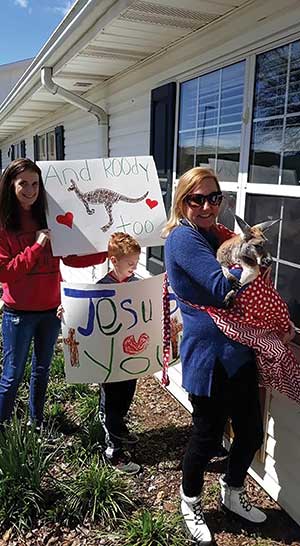
“I’ve always been fascinated with kangaroos,” said Danny, who got ROOdy from a petting zoo in Louisiana. “When they’re born, they’re about the size of a jelly bean. They aren’t fully formed when they get to the pouch, and they’re there for about six months,” he said.
ROOdy was seven months old when he came to the farm and was in the “in and out phase,” spending much of the time in one of his manmade pouches and the rest of the time exploring his surroundings. He came from the zoo with two cotton knapsack-like pouches, and a friend of the Davidsons later made him some larger ones.
“At first, he stayed in his pouch the majority of the day and got out for playtime for three to four hours,” Caren said. “Since then, he’s been transitioning from the pouch and mostly sleeps there at night.” These days, ROOdy hops around the house and yard pretty freely. “He loves to follow us around,” Danny said.
ROOdy took three bottles a day when he first arrived and was down to a nightly bottle and cuddle on the couch by spring. The Davidsons order a special milk that’s formulated for kangaroos and is made in Australia, and ROOdy also enjoys timothy grass and a dry kangaroo food that’s similar to dog food.
His sense of adventure is as big as his appetite. A week after arriving, ROOdy joined the Davidsons for a planned beach trip with Danny’s family. “We had rented a beach house, and they didn’t list kangaroos as a problem,” Caren said with a laugh. “He stayed in his pouch and our nieces and nephews loved feeding him bottles. We put a harness on him one day so we could let him hop around the sand. He liked the sand, but he did not like the harness.”
The Davidsons knew ROOdy needed to be neutered early so he wouldn’t be aggressive, and they were shocked and relieved to find the solution just a few miles away. They learned that Dr. Paul Taylor, an associate at Branchville Animal Hospital, had a little experience with kangaroos, helping to provide dental treatment to one when he was at a clinic in another state.
Neutering a kangaroo was a skill he had yet to master, however. “I always say you should do something every day that scares you,” Taylor quipped, adding that he consulted with veterinarians in Texas and Maryland, both of whom own kangaroos, before performing the procedure, which went off without a hitch. Taylor said he will continue to see ROOdy at least once a year for a check-up and shots, and he’ll do all he can to help the Davidsons care for him.
While ROOdy seems right at home in the Davidson’s house, he’ll soon have a bigger place to call home. The couple, with the help of friends, fenced off two acres for him to share with the goats. “Kangaroos are actually very heat and cold tolerant,” Caren said. “In the winter, they just need a covered shelter and straw for bedding, and in the summer, they need shade.”
Danny, especially, is looking forward to introducing ROOdy to those visiting the farm. “If people love feeding horses, goats and chickens, I know they’re going to love feeding a kangaroo,” he said.
“Our animals are our family, and we get joy out of sharing them with others,” added Caren, who admits she fell in love with the best gift she never knew she wanted. “Who knows, once ROOdy has been in his habitat for a while, and we know that he’s happy there, I could see getting one more kangaroo.”
You can find more info at myfarmday.com











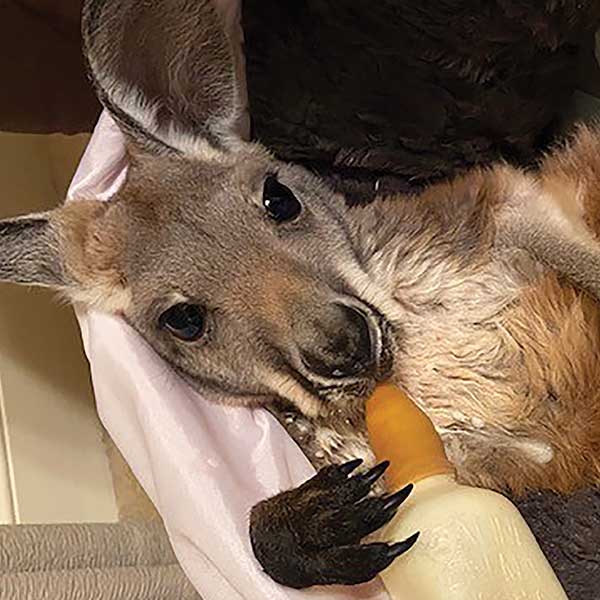
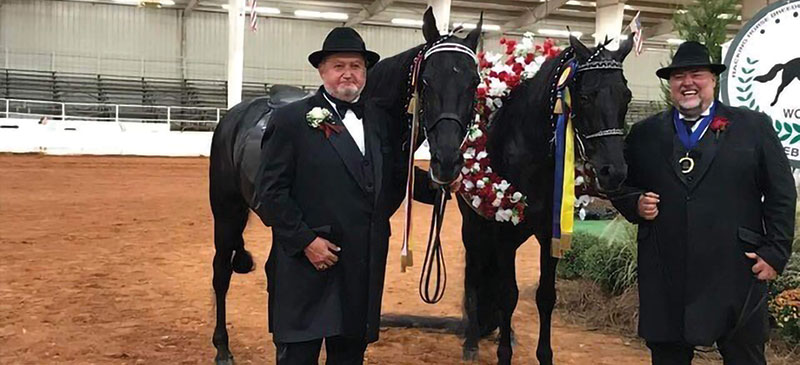

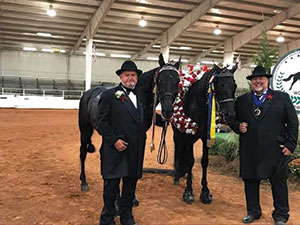

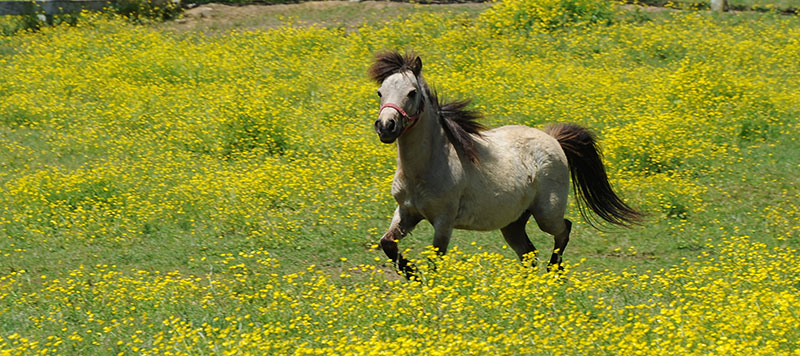
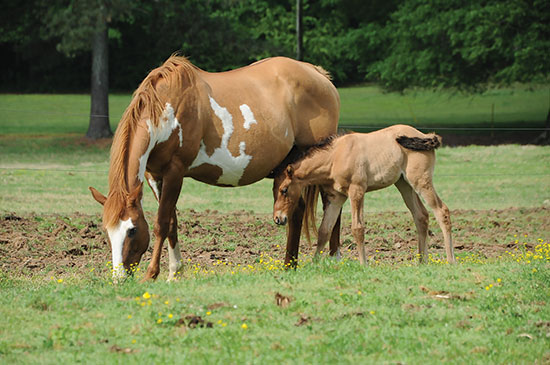
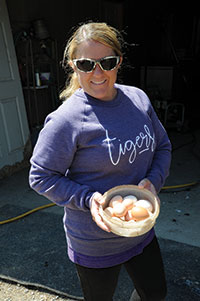
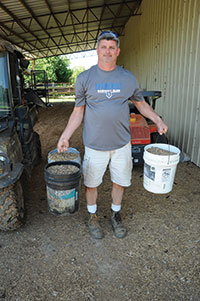

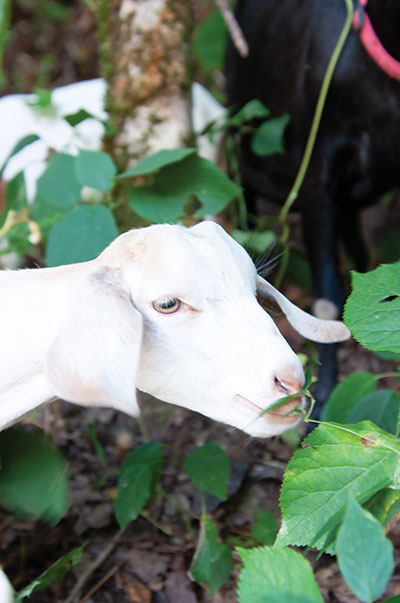
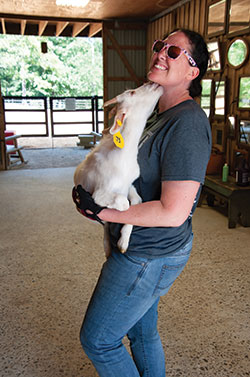 She found a company in Tennessee – Rent-A-Ruminant – that would bring a herd of goats to Alabama and let them do what goats do best. And on a warm, sunny day in August, kudzu started tumbling down like a row of dominos given a mighty thump.
She found a company in Tennessee – Rent-A-Ruminant – that would bring a herd of goats to Alabama and let them do what goats do best. And on a warm, sunny day in August, kudzu started tumbling down like a row of dominos given a mighty thump.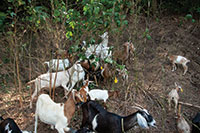 She decided when she returned home, she would buy a goat. And that she did. Her first was a Nigerian Dwarf, Becka, and you might say that goat cleared the path forward for her in more ways than one. After a second tour, this time in Afghanistan, she decided that when her Army career ended, her next career would involve goats. She had already started her farm and had moved to standard sized goats.
She decided when she returned home, she would buy a goat. And that she did. Her first was a Nigerian Dwarf, Becka, and you might say that goat cleared the path forward for her in more ways than one. After a second tour, this time in Afghanistan, she decided that when her Army career ended, her next career would involve goats. She had already started her farm and had moved to standard sized goats.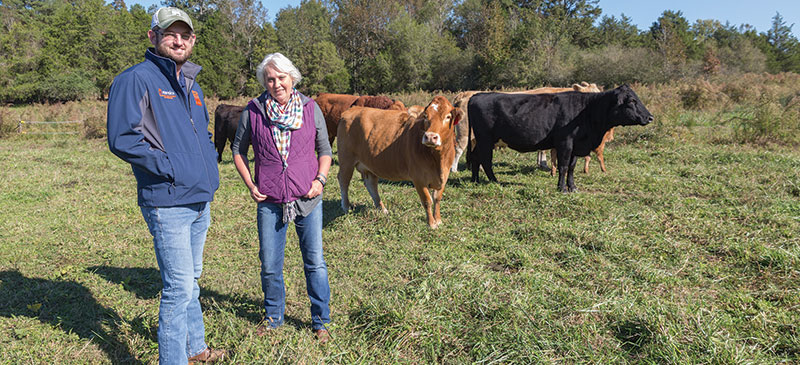
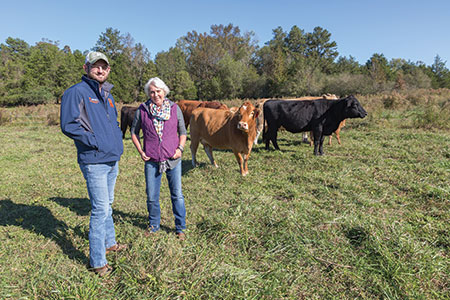
 Nancy Graves is the 4-H Foundation regional agent, while Becky Staples serves as a 4-H agent assistant for St. Clair County. Staples goes into local schools with various programs like Skins & Skulls, a science program that gives fourth-graders an up-close-and-personal look at the structure of wild animals in the woods of St. Clair County. She also conducts a Classroom in the Forest program and takes a group of kids to 4-H camp every summer. Graves is in charge of all volunteer-led clubs, including the 4-H after-school club and specialty clubs that focus on horses, archery and shotguns.
Nancy Graves is the 4-H Foundation regional agent, while Becky Staples serves as a 4-H agent assistant for St. Clair County. Staples goes into local schools with various programs like Skins & Skulls, a science program that gives fourth-graders an up-close-and-personal look at the structure of wild animals in the woods of St. Clair County. She also conducts a Classroom in the Forest program and takes a group of kids to 4-H camp every summer. Graves is in charge of all volunteer-led clubs, including the 4-H after-school club and specialty clubs that focus on horses, archery and shotguns.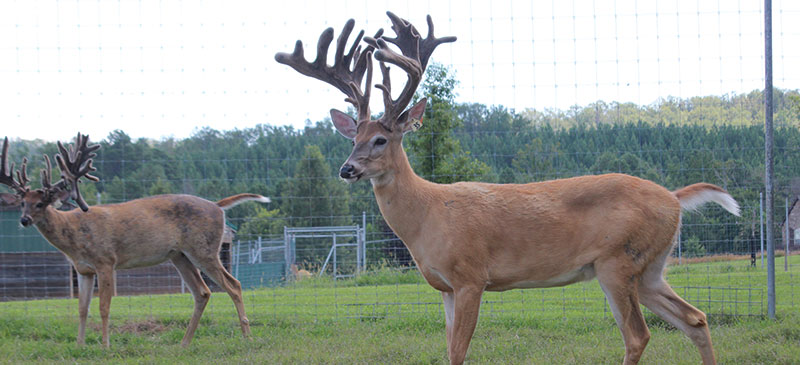
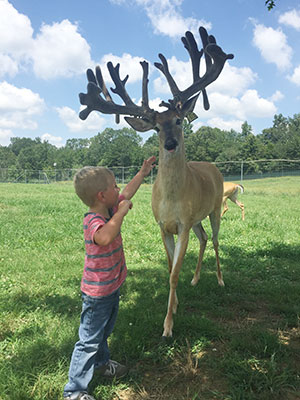 Deer farm in Odenville building a brand, bringing visitors’ smiles
Deer farm in Odenville building a brand, bringing visitors’ smiles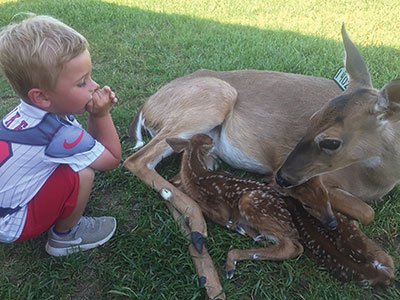 Owners Dane and Katelyn Dorsett and family are not your typical farmers, they breed deer, which now number 140 head, including fawns. And they sell to other breeders and owners of huge hunting enclosures around Alabama, fetching $4,000 and up each.
Owners Dane and Katelyn Dorsett and family are not your typical farmers, they breed deer, which now number 140 head, including fawns. And they sell to other breeders and owners of huge hunting enclosures around Alabama, fetching $4,000 and up each. Macy, the Dorsetts’ dog, hops aboard the all-terrain vehicle, keeping an eye on things and getting out at every stop. “She goes in every pen with me,” Dorsett said. She’s even been known to ‘kiss’ a deer or two.
Macy, the Dorsetts’ dog, hops aboard the all-terrain vehicle, keeping an eye on things and getting out at every stop. “She goes in every pen with me,” Dorsett said. She’s even been known to ‘kiss’ a deer or two.